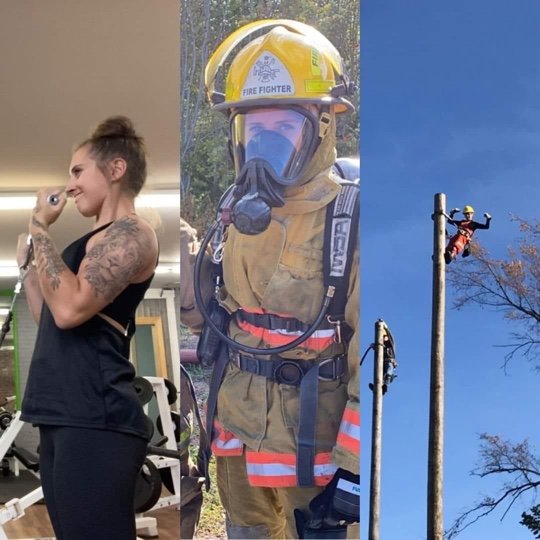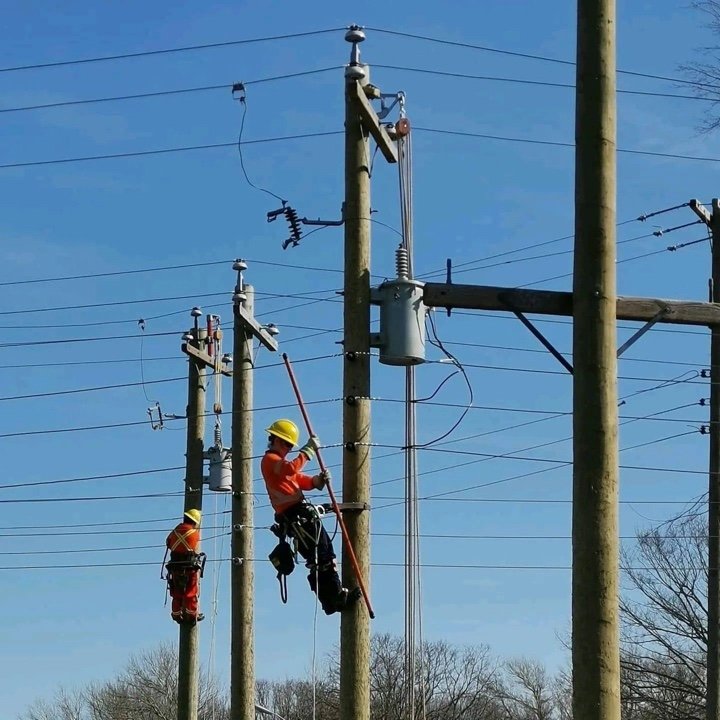Nerves of Steel, Arms of a Warrior Goddess
I’ve heard more than one women’s fitness instructor opine that toned arms on a female are what really take her physique to the next level. Shoulders, lats, traps, and biceps can be particularly challenging for women to develop, so when they do take shape, it’s impressive. Empowering. Inspiring. A woman with arms is a woman who can put in the work, take care of business (no more asking the guy in the house to twist the lid off of something) and rock a tank top.
Melissa is dedicated to fitness so that she can be a superior firefighter and powerline technician.
Melissa Dawe, 26, is one such example. This industrious mom of two from Nova Scotia, Canada, says keeping fit is key to performing optimally as a first-year apprentice powerline technician and firefighter. She is a recent graduate of the Utility Line Work - Construction and Maintenance program at Nova Scotia Community College and a member of IBEW Local 1928, working toward her dream career of being a journeyman powerline technician.
According to a recent article in Industrial Safety & Hygiene News, powerline work ranks as one of the top 10 most dangerous jobs, with a fatal injury rate of 20 per 100,000 workers. Other sources indicate that it is even more dangerous than that, citing 42 for every 100,000 linemen killed on the job each year. Those who brave this trade are required to scale electrical poles or use bucket trucks to test, install or maintain high-voltage equipment — sometimes during bad weather.
With such real prospects of falls, electrocution, burns and nerve-damaging shocks, I had to ask Melissa — Why?
“[When I worked in traffic control], I worked with powerline technicians at Nova Scotia Power pretty often,” she said. “I would watch the work they were doing, work that was both intricate and thrilling, and I knew that was what I wanted to do. I applied for the course [at Nova Scotia Community College], which has about a two-year waitlist.” The course emphasizes safety, classroom work and hands-on training. It also increases employability. Especially in an area like Melissa’s, where there is more supply than demand for workers in this field. “When I eventually did get accepted, I was so ecstatic. I couldn’t wait to tell anybody who would listen!”
“When you are climbing the pole or [are] in the aerial bucket, you always maintain your limits of approach. It’s encouraging that the people I’m working with trust me to take it on.”
Melissa said she was nervous when she started the program. After all, she was the only female in a class of 26 people. In Canada, women represent approximately 1 to 2% of active powerline technicians working in the electricity industry. According to Electricity Human Resources Canada, some barriers that women face include “discrimination, a lack of mentorship and a non-inclusive workplace culture.”
“We had a great group of students and instructors though, and I was never made to feel like I didn’t belong. We worked well together, helped each other and it was overall a great experience,” she said, adding that she has had the same positive experience at the companies where she’s apprenticed.
“[The women] who are in this industry are very helpful and they love to see other women come into the industry. I have worked in other male-dominated industries where women tend to make things a competition,” said Melissa.
“However, in this industry, the women are so supportive and encouraging. It really makes such a big difference. There is a group on Facebook called Line Ladies for Female Line Technicians. So when you need advice or are struggling, the girls are great to talk to.”
On the job at Vista Care Communications, Melissa has been learning about new builds and pole transfers, transferring lines from an old pole to a new one. “When you get out into the workforce, you really see why safety is so important, but also what makes the job dangerous. You really have to watch all around you when working around powerlines,” she said. “When you are climbing the pole or [are] in the aerial bucket, you always maintain your limits of approach. It’s encouraging that the people I’m working with trust me to take it on.”
In addition to working at Vista and firefighting in her spare time, Melissa has also started doing storm work with a company called Tri Wire. They are helping her to start her full apprenticeship. “Just because you are a woman doesn’t mean you can or can’t do something,” she said. “If it is something you really want and are interested in, as long as you put the time and effort into it and you really try, you can do it. If you fail at something, don’t give up. Get back up and try again.”



